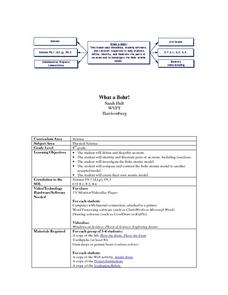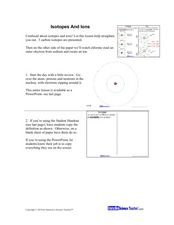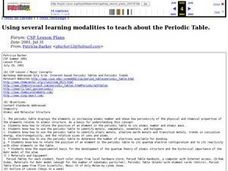Curated OER
Atomic Emission Spectra and the Bohr Model of the Atom
High schoolers investigate the wavelengths of spectra lines for common atoms. In this atomic emission spectra lesson plan, students use a transformer and diffraction grating to observe the emission spectra of various atoms. They find the...
Cornell University
What Happens When We Excite Atoms and Molecules?
Excited atoms lead to exciting lessons! Learners use heat and light to excite both atoms and molecules. They display their learning in the form of Bohr models depicting the excited state of the atoms.
Curated OER
Atomic Structure
Young scholars are introduced to moles and Avogadro's number, Bohr's model, Atomic emission spectra and quantum numbers. They also comprehend the current model of atoms and how electrons are described by quantum numbers.
Curated OER
What a Bohr!
Students define, identify and illustrate the parts of an atom, and investigate the Bohr atomic model. Students watch a multimedia presentation to understand an atom's parts and their functions. In groups, they create a model of an atom...
Curated OER
Mystery : Structure of the Atom-A Case for Indirect Evidence
Students investigate the structure of the atom through hands on activities. In this atomic structure lesson, students perform 4 activities showing indirect evidence of the structure of the atom and the parts of the atom. They also list...
Curated OER
Isotopes and Ions
Students examine the concepts of isotopes and atoms. In this powerpoint lesson, students see the balance in numbers of protons, neutrons, and electrons create isotopes and ions of certain atoms.
Curated OER
Understanding: Uncertainty
Students discuss the Heisenberg uncertainty principle and how it applies to the subatomic world. Working in groups, they design a model that would help others to understand the uncertainty principle. Written explanations are included...
Curated OER
The Day the Atom Died (Grade K-1)
Students investigate what is wrong with the Rutherford atomic model. In this chemistry lesson, students answer questions about the atomic model after watching a video. They draw conclusions from the video and discuss how the atomic model...
Curated OER
If My Configurations are Correct
Students write the electron configuration of elements in the ground state. In this chemistry lesson, students draw how subatomic particles are arranged in the atom. They construct Lewis dot diagrams of valence electrons.
Curated OER
History of Atomic Theory
Students study the significance of the quantum model and how scientific theories adapt over time. In this investigative lesson students describe the contributions that scientists have helped develop the atomic theory and identify...
Curated OER
Electromagnetic Spectrum/Spectroscopy
Students examine the electromagnetic spectrum and demonstrate the elements within. In this investigative instructional activity students complete a demonstration and calculate the energy of a photon.
Curated OER
The Hall of Physicist
Students study the history and scientific contributions of Albert Einstein. In this Albert Einstein lesson plan, students learn his history, research his scientific contributions, create a timeline of him and his work, and create a...
NASA
Supernova Chemistry
By measuring the wavelength, frequency, and intensity of electromagnetic radiation, scientists determine the temperature, density, and composition of far away items. Scholars rotate through ten lab stations using a spectroscope at each...
Curated OER
Physicists or Philosophers?
Trace the sequential process of the developing theories of atomic structure in the early 20th century, show, in historical development, how scientists "know" things, how experiments are set up and how interpretations are drawn from them,...
Curated OER
Physical and Chemical Changes
Eighth graders view a PowerPoint presentation that assist them in distinguishing between physical and chemical changes. They compare their observations of demonstrations to a list of clues recognizing types of changes.
Curated OER
Using several learning modalities to teach about the Periodic Table.
Students identify how to relate the position of an element in the periodic table to its atomic number and atomic mass. They identify how to use the periodic table to identify metals, semimetals, nonmetals, and halogens, and also,...
Curated OER
Static Cling
Students work together to discover the concept of static electricity. They participate in an experiment in which they test different objects charge. They make observations and record them for later use.
















